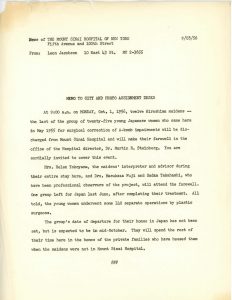The 60th Anniversary of the Hiroshima Maidens Project
Sixty years ago this month, The Mount Sinai Hospital said goodbye to the last of a group of 25 women from Hiroshima, Japan who had spent over a year at the Hospital having surgeries to repair injuries they suffered in the nuclear blasts that ended World War II. The group of young women were called the Hiroshima
Maidens, and the project that brought them from Japan to the U.S. was the brainchild of Norman Cousins, the Editor of the Saturday Review of Literature. He raised the funds needed for the project and enlisted the help of the Quaker community of the metropolitan New York region to house the Maidens when they were not in the Hospital. Three surgeons from The Mount Sinai Hospital volunteered their time (Drs. Arthur Barsky, Bernard Simon and Sidney Kahn), and the President of the Hospital, Alfred Rose, anonymously paid for the use of four hospital beds for the duration of the project.
The Hiroshima Maidens project was a milestone in postwar American-Japanese relations. Before leaving Japan, the girls were told by some that the American doctors were going to experiment on them. As it became clear that this was not the case, the donated funds were stretched to allow Japanese doctors to come to Mount Sinai and receive training in plastic and reconstructive surgery, thus helping to strengthen the field in Japan.
The Hiroshima Maidens project continued to have life. In 1995, one of the Maidens returned to Mount Sinai to meet with Dr. Simon. At that time she gave the Mount Sinai Archives a scrapbook of photocopies of images from Hiroshima after the blast. The next year there was a conference at Mount Sinai that celebrated the project from 40 years before, and highlighted Mount Sinai’s current international efforts. In spring 2005, for the 50th anniversary of the project, the last remaining Maiden and a group of Japanese press visited Mount Sinai once again. The group came to the Archives and looked at the photos from the 1950s and read again the newspaper accounts of the Maidens’ courageous journey to New York.
On this 60th anniversary, it is unknown if any Maidens are still alive. Still, it is comforting to know that the memory – and documentation – of the project lives on, and will not be forgotten.

